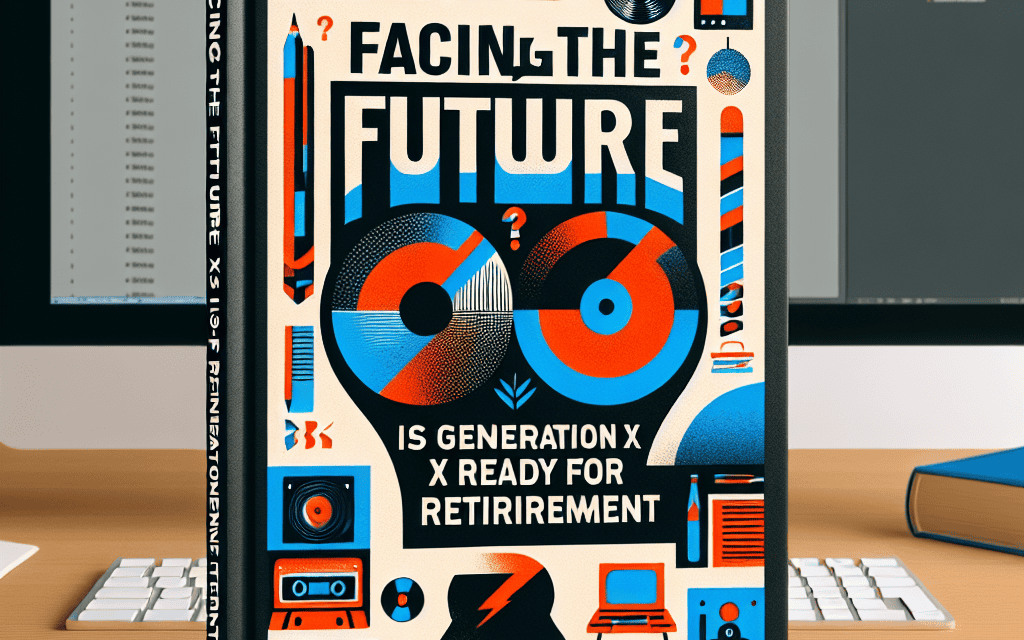“Generation X: Navigating the Path to a Secure Retirement Future.”
Introduction
“Facing the Future: Is Generation X Ready for Retirement?” explores the financial preparedness and unique challenges faced by Generation X as they approach retirement age. Born between 1965 and 1980, this cohort has experienced significant economic shifts, including the transition from traditional pensions to 401(k) plans, the impact of the Great Recession, and the evolving landscape of healthcare and social security. As they stand on the brink of retirement, Generation X must navigate these complexities while addressing concerns about savings adequacy, investment strategies, and long-term financial security. This examination delves into the readiness of Generation X to retire comfortably, considering both the obstacles they face and the strategies they employ to secure their financial futures.
Understanding Generation X: Financial Preparedness for Retirement
As the world continues to evolve, the financial landscape for retirement is undergoing significant changes, particularly for Generation X, those born between 1965 and 1980. This cohort, often sandwiched between the larger Baby Boomer and Millennial generations, faces unique challenges and opportunities as they approach retirement age. Understanding the financial preparedness of Generation X is crucial, as it provides insights into the broader economic trends and potential policy implications that could shape the future of retirement.
To begin with, Generation X has experienced a series of economic fluctuations throughout their lives, from the dot-com bubble burst in the early 2000s to the Great Recession of 2008. These events have significantly impacted their financial stability and savings habits. Unlike their predecessors, many Gen Xers have not benefited from the same level of pension security, as the shift from defined benefit plans to defined contribution plans, such as 401(k)s, has placed more responsibility on individuals to manage their retirement savings. Consequently, this generation has had to navigate a more complex financial environment, often without the same level of guidance or support that previous generations received.
Moreover, the rising cost of living, coupled with stagnant wage growth, has further complicated the financial outlook for Generation X. Many individuals in this age group are still supporting children or even aging parents, which can strain their ability to save adequately for retirement. Additionally, the burden of student loan debt, which some Gen Xers still carry, adds another layer of financial pressure. These factors contribute to a sense of uncertainty and anxiety about their financial future, as they must balance immediate financial obligations with long-term retirement planning.
Despite these challenges, there are opportunities for Generation X to improve their financial preparedness for retirement. One key strategy is to take advantage of catch-up contributions to retirement accounts, which allow individuals over 50 to contribute additional funds to their 401(k) or IRA. This can help bridge the gap for those who may have started saving later in life or experienced interruptions in their savings journey. Furthermore, financial literacy and education play a crucial role in empowering Gen Xers to make informed decisions about their retirement planning. By seeking professional financial advice and utilizing available resources, individuals can develop a comprehensive strategy that aligns with their goals and circumstances.
In addition to personal strategies, there is a growing need for policy interventions that address the unique challenges faced by Generation X. Policymakers could consider initiatives that promote financial literacy, incentivize savings, and provide more robust safety nets for those nearing retirement age. Such measures could alleviate some of the financial pressures and create a more secure environment for future retirees.
In conclusion, while Generation X faces distinct challenges in preparing for retirement, there are pathways to enhance their financial readiness. By understanding the economic context and leveraging available resources, Gen Xers can take proactive steps toward securing their financial future. As society continues to grapple with the complexities of retirement planning, it is essential to recognize the diverse needs of different generations and implement strategies that support their unique circumstances. Through a combination of personal responsibility and supportive policies, Generation X can navigate the uncertainties of the future and achieve a more stable and fulfilling retirement.
The Impact of Economic Shifts on Generation X’s Retirement Plans
As Generation X approaches the threshold of retirement, the economic landscape they face is markedly different from that of previous generations. Born between 1965 and 1980, this cohort has witnessed significant economic shifts that have shaped their financial outlook and retirement plans. The transition from defined benefit pension plans to defined contribution plans, such as 401(k)s, has placed the onus of retirement savings squarely on the shoulders of individuals. This shift has required Generation X to become more financially literate and proactive in managing their retirement savings, a task that has proven challenging for many.
Moreover, the economic recessions of the early 2000s and the 2008 financial crisis have had lasting impacts on Generation X’s financial stability. These events not only affected their immediate financial well-being but also had long-term implications for their retirement savings. Many in this generation experienced job losses, reduced income, and diminished home values, which in turn affected their ability to save for retirement. As a result, a significant portion of Generation X finds itself playing catch-up in terms of retirement savings, with some even questioning whether they will be able to retire at all.
In addition to these economic challenges, Generation X is also navigating the complexities of supporting both aging parents and their own children. This “sandwich generation” is often caught between the financial demands of caring for elderly parents and funding their children’s education, further straining their ability to save for retirement. The rising costs of healthcare and education exacerbate this situation, leaving many Gen Xers feeling financially squeezed and uncertain about their future.
Despite these challenges, there are strategies that Generation X can employ to bolster their retirement readiness. Financial advisors often recommend maximizing contributions to retirement accounts, such as 401(k)s and IRAs, to take advantage of tax benefits and compound interest. Additionally, diversifying investments can help mitigate risk and potentially increase returns over time. For those who may have started saving later in life, catch-up contributions for individuals over 50 can provide an opportunity to boost retirement savings.
Furthermore, it is crucial for Generation X to engage in comprehensive retirement planning, which includes not only saving but also understanding potential income sources in retirement, such as Social Security and pensions. Estimating future expenses and creating a realistic budget can help individuals set achievable savings goals and make informed decisions about their retirement lifestyle.
As Generation X contemplates retirement, it is also important to consider the role of continued employment. Many in this cohort are exploring the possibility of working beyond traditional retirement age, either out of necessity or choice. Part-time work or consulting can provide additional income and help bridge the gap between savings and retirement needs, while also offering a sense of purpose and engagement.
In conclusion, while Generation X faces unique economic challenges as they prepare for retirement, there are proactive steps they can take to improve their financial outlook. By focusing on saving, investing wisely, and planning comprehensively, this generation can navigate the uncertainties of the future and work towards a secure and fulfilling retirement. The key lies in adaptability and a willingness to embrace new strategies in the face of an ever-evolving economic environment.
Navigating Healthcare Costs: A Challenge for Generation X Retirees
As Generation X approaches the threshold of retirement, a myriad of challenges loom on the horizon, with healthcare costs emerging as a particularly daunting concern. This cohort, born between 1965 and 1980, finds itself sandwiched between the well-documented retirement struggles of the Baby Boomers and the evolving financial landscapes faced by Millennials. As they prepare to transition from the workforce to retirement, Generation X must navigate the complexities of healthcare expenses, which are projected to rise significantly in the coming decades.
To begin with, it is essential to understand the unique position of Generation X in the retirement landscape. Unlike their predecessors, many Gen Xers have experienced economic volatility, including the dot-com bubble burst and the 2008 financial crisis, which have impacted their savings and investment strategies. Consequently, their financial preparedness for retirement is often less robust than desired. This financial fragility is compounded by the anticipated increase in healthcare costs, which are expected to outpace inflation and consume a larger portion of retirees’ budgets.
Moreover, the healthcare system itself presents a labyrinth of options and decisions that can be overwhelming for those unprepared. Medicare, the primary health insurance program for retirees, covers a significant portion of medical expenses but is not all-encompassing. Many services, such as dental, vision, and long-term care, require additional coverage through supplemental insurance plans, which can be costly. As a result, Generation X retirees must carefully evaluate their healthcare needs and the associated costs to ensure they are adequately covered without depleting their savings.
In addition to navigating Medicare and supplemental insurance, Generation X must also contend with the rising costs of prescription medications. Pharmaceutical expenses have been steadily increasing, driven by factors such as the introduction of new, high-priced drugs and the lack of generic alternatives for certain treatments. This trend poses a significant financial burden on retirees, who often require multiple medications to manage chronic conditions. Consequently, it is imperative for Gen Xers to explore cost-saving measures, such as generic drug options and mail-order pharmacies, to mitigate these expenses.
Furthermore, the potential need for long-term care is a critical consideration for Generation X as they plan for retirement. With life expectancies increasing, the likelihood of requiring assistance with daily activities or medical care in later years is a reality that cannot be ignored. Long-term care insurance can provide a safety net, but it is often expensive and may not cover all necessary services. Therefore, Gen Xers must weigh the benefits and costs of such insurance against their overall retirement strategy.
In light of these challenges, it is crucial for Generation X to adopt a proactive approach to retirement planning, with a particular focus on healthcare costs. Financial advisors can play a pivotal role in helping individuals assess their current financial situation, project future expenses, and develop a comprehensive plan that addresses both anticipated and unforeseen healthcare needs. Additionally, staying informed about changes in healthcare policy and insurance options can empower Gen Xers to make informed decisions that align with their retirement goals.
In conclusion, as Generation X stands on the brink of retirement, the specter of rising healthcare costs demands careful consideration and strategic planning. By understanding the intricacies of the healthcare system, exploring cost-saving measures, and seeking professional guidance, Gen Xers can better position themselves to face the future with confidence and financial security.
The Role of Technology in Shaping Generation X’s Retirement Experience

As Generation X approaches retirement, the role of technology in shaping their retirement experience becomes increasingly significant. Born between 1965 and 1980, this cohort has witnessed the rapid evolution of technology, from the advent of personal computers to the rise of the internet and smartphones. Consequently, their familiarity with digital tools positions them uniquely to leverage technology in planning and enjoying their retirement years. However, the question remains: is Generation X truly ready to embrace these technological advancements to secure a comfortable retirement?
To begin with, technology offers a plethora of resources that can aid Generation X in financial planning. Online platforms and mobile applications provide easy access to financial advice, investment opportunities, and retirement planning tools. These digital resources enable individuals to track their savings, manage investments, and project future financial needs with greater accuracy. Moreover, robo-advisors, which use algorithms to offer personalized investment advice, have become increasingly popular among this tech-savvy generation. By utilizing these tools, Generation X can make informed decisions about their retirement savings and investments, potentially enhancing their financial security in later years.
In addition to financial planning, technology also plays a crucial role in healthcare management, which is a significant concern for those approaching retirement. Wearable devices and health monitoring apps allow individuals to track their physical activity, heart rate, and other vital signs, promoting a proactive approach to health management. Telemedicine services have also gained traction, providing convenient access to healthcare professionals without the need for in-person visits. For Generation X, who may be juggling the responsibilities of caring for aging parents while planning their own retirement, these technological advancements offer a means to maintain their health and well-being more efficiently.
Furthermore, technology has transformed the way retirees can engage with the world, offering new opportunities for social interaction and lifelong learning. Social media platforms and video conferencing tools enable retirees to stay connected with family and friends, reducing the risk of social isolation, which is often a concern for older adults. Additionally, online courses and virtual workshops provide avenues for intellectual stimulation and skill development, allowing retirees to pursue new interests or even second careers. For Generation X, who values independence and personal growth, these technological resources can significantly enhance their quality of life during retirement.
However, despite these advantages, there are challenges that Generation X must address to fully harness the potential of technology in retirement. Digital literacy varies within this cohort, and some individuals may struggle to keep pace with rapidly evolving technologies. Ensuring that all members of Generation X have the necessary skills to navigate digital tools is essential for maximizing their benefits. Moreover, concerns about data privacy and cybersecurity must be addressed, as retirees increasingly rely on digital platforms for financial transactions and personal information management.
In conclusion, while technology offers numerous opportunities to enhance the retirement experience for Generation X, it also presents challenges that must be navigated carefully. By embracing digital tools for financial planning, healthcare management, and social engagement, this generation can potentially secure a more comfortable and fulfilling retirement. However, it is crucial to address issues of digital literacy and cybersecurity to ensure that all individuals can confidently and safely utilize these technological advancements. As Generation X stands on the brink of retirement, their readiness to integrate technology into their lives will play a pivotal role in shaping their future.
Generation X and the Gig Economy: Retirement Savings Strategies
As Generation X approaches the threshold of retirement, a unique set of challenges and opportunities emerges, particularly in the context of the gig economy. Born between 1965 and 1980, this cohort has witnessed significant shifts in the economic landscape, including the rise of non-traditional employment. The gig economy, characterized by short-term contracts and freelance work, has become a defining feature of their professional lives. Consequently, Generation X faces the task of navigating retirement savings strategies that align with this evolving work environment.
To begin with, the gig economy offers flexibility and autonomy, appealing to many within Generation X who value work-life balance. However, this flexibility often comes at the cost of traditional employment benefits, such as employer-sponsored retirement plans. Without the safety net of a 401(k) or pension, gig workers must take a proactive approach to retirement savings. This necessitates a shift in mindset, where individuals assume greater responsibility for their financial futures. As a result, self-directed retirement accounts, such as Individual Retirement Accounts (IRAs) and Solo 401(k)s, have gained prominence among this demographic.
Moreover, the unpredictable nature of gig work income requires Generation X to adopt a disciplined savings strategy. Unlike salaried employees with consistent paychecks, gig workers experience fluctuating earnings, making it essential to prioritize savings during periods of higher income. Establishing an emergency fund is a critical first step, providing a financial cushion that can prevent the need to dip into retirement savings during lean times. Additionally, automating contributions to retirement accounts can help ensure consistent savings, even when income varies.
In addition to these strategies, diversification plays a crucial role in securing a stable retirement for Generation X. Given the inherent uncertainties of the gig economy, relying solely on one source of income or investment can be risky. Diversifying income streams, such as combining gig work with part-time employment or passive income sources, can provide a more stable financial foundation. Similarly, diversifying investment portfolios across various asset classes can mitigate risk and enhance potential returns, thereby strengthening retirement savings.
Furthermore, financial literacy is paramount for Generation X as they navigate the complexities of retirement planning in the gig economy. Understanding the nuances of tax implications, investment options, and retirement account regulations is essential for making informed decisions. Many within this generation may benefit from seeking professional financial advice to tailor a retirement strategy that aligns with their unique circumstances. Financial advisors can offer valuable insights into optimizing savings, managing debt, and maximizing investment growth.
As Generation X contemplates retirement, it is also important to consider the role of government policies and social safety nets. While personal savings are crucial, public programs such as Social Security will continue to play a significant role in retirement planning. Staying informed about potential changes to these programs and advocating for policies that support gig workers can help ensure a more secure retirement landscape.
In conclusion, Generation X faces a distinctive set of challenges as they prepare for retirement within the gig economy. By embracing self-directed savings strategies, maintaining financial discipline, diversifying income and investments, and enhancing financial literacy, they can effectively navigate these challenges. As this generation stands on the cusp of retirement, proactive planning and adaptability will be key to securing a financially stable future.
Social Security and Generation X: What to Expect in Retirement
As Generation X approaches the threshold of retirement, a wave of uncertainty looms over their financial future, particularly concerning Social Security benefits. Born between 1965 and 1980, this cohort is now in their early 40s to late 50s, a critical period for retirement planning. The question of whether Social Security will provide adequate support is a pressing concern, given the evolving economic landscape and demographic shifts. Understanding what Generation X can expect from Social Security in retirement requires a closer examination of current trends and potential reforms.
To begin with, it is essential to recognize the challenges facing the Social Security system. The program, established in 1935, was designed to provide a safety net for retirees, funded through payroll taxes from the current workforce. However, demographic changes, such as increased life expectancy and lower birth rates, have strained the system. As the Baby Boomer generation retires, the ratio of workers to beneficiaries is decreasing, leading to projections that the Social Security Trust Fund may be depleted by the mid-2030s. This scenario raises concerns about the sustainability of benefits for Generation X.
In light of these challenges, it is crucial for Generation X to understand the potential implications for their retirement. If no legislative changes are made, Social Security benefits could be reduced by approximately 20% once the trust fund reserves are exhausted. This potential reduction underscores the importance of proactive retirement planning. Generation X must consider diversifying their retirement income sources, such as personal savings, investments, and employer-sponsored retirement plans, to mitigate the risk of reduced Social Security benefits.
Moreover, the political landscape plays a significant role in shaping the future of Social Security. Policymakers have proposed various reforms to address the program’s financial challenges, ranging from increasing the retirement age to adjusting the payroll tax cap. While these proposals aim to ensure the long-term viability of Social Security, they also introduce uncertainty for those nearing retirement. Generation X must stay informed about potential policy changes and their implications, as these could significantly impact their retirement planning strategies.
In addition to policy considerations, economic factors also influence the outlook for Social Security. Inflation, wage growth, and employment rates all affect the program’s revenue and expenditure. For instance, higher inflation could erode the purchasing power of Social Security benefits, while stagnant wage growth may limit the program’s funding. Consequently, Generation X should remain vigilant about economic trends and adjust their financial plans accordingly to safeguard their retirement security.
Furthermore, financial literacy is paramount for Generation X as they navigate the complexities of retirement planning. Understanding the nuances of Social Security, such as eligibility criteria, benefit calculations, and claiming strategies, can empower individuals to make informed decisions. Educational resources and financial advisors can provide valuable guidance, helping Generation X optimize their retirement outcomes.
In conclusion, while the future of Social Security presents challenges for Generation X, it also offers opportunities for strategic planning and adaptation. By staying informed about policy developments, economic trends, and financial strategies, this generation can better prepare for retirement. As they face the future, Generation X must embrace a proactive approach to ensure that Social Security, alongside other income sources, supports a secure and fulfilling retirement.
Lifestyle Changes: How Generation X is Redefining Retirement Living
As Generation X approaches the threshold of retirement, a significant shift in lifestyle expectations and preparations is becoming increasingly evident. Born between 1965 and 1980, this cohort is now in their late 40s to mid-50s, a stage of life traditionally associated with planning for the golden years. However, unlike their predecessors, Generation X is redefining what retirement living means, driven by unique economic, social, and technological influences that have shaped their lives.
To begin with, financial preparedness is a critical concern for Generation X, as they have faced distinct economic challenges that have impacted their retirement savings. Many in this generation entered the workforce during periods of economic instability, such as the early 1990s recession and the 2008 financial crisis. These events, coupled with the decline of traditional pension plans and the rise of defined contribution plans like 401(k)s, have necessitated a more proactive approach to retirement savings. Consequently, Generation X is increasingly focused on financial literacy and investment strategies to ensure a secure retirement. They are more likely to seek professional financial advice and utilize technology-driven tools to manage their portfolios, reflecting a pragmatic approach to financial planning.
In addition to financial considerations, Generation X is also redefining retirement through their lifestyle choices. Unlike previous generations who often viewed retirement as a time for rest and leisure, many Gen Xers envision a more active and engaged post-work life. This shift is partly due to advances in healthcare and increased life expectancy, which have made it possible for individuals to remain healthy and active well into their later years. As a result, many in this generation are planning to continue working in some capacity, whether through part-time jobs, consulting roles, or entrepreneurial ventures. This desire to remain professionally active is not only financially motivated but also driven by a pursuit of personal fulfillment and a sense of purpose.
Moreover, Generation X is embracing technology as a means to enhance their retirement experience. Having witnessed the digital revolution firsthand, they are comfortable with using technology to stay connected, access information, and manage their daily lives. This tech-savvy approach extends to their retirement planning, with many utilizing online platforms for financial management, health monitoring, and social engagement. The integration of technology into their retirement lifestyle allows for greater flexibility and autonomy, enabling them to maintain a high quality of life while adapting to the changing demands of aging.
Furthermore, the social dynamics of retirement are evolving for Generation X, as they prioritize community and social connections. Unlike the more isolated retirement experiences of the past, Gen Xers are seeking out vibrant communities that offer opportunities for social interaction and cultural engagement. This trend is reflected in the growing popularity of active adult communities and urban retirement living, where residents can enjoy a range of amenities and activities that promote socialization and well-being. By fostering strong social networks, Generation X is redefining retirement as a time for continued growth and connection.
In conclusion, as Generation X approaches retirement, they are reshaping the traditional notions of what it means to retire. Through a combination of financial prudence, active lifestyle choices, technological integration, and a focus on community, they are crafting a retirement experience that is both dynamic and fulfilling. As they navigate this new phase of life, Generation X is setting a precedent for future generations, demonstrating that retirement can be a time of opportunity and reinvention.
Q&A
1. **What is the main concern for Generation X regarding retirement?**
Generation X is primarily concerned about financial insecurity due to inadequate savings and the potential insufficiency of Social Security benefits.
2. **How does Generation X’s retirement savings compare to previous generations?**
Generation X generally has less retirement savings compared to Baby Boomers, partly due to economic challenges and the decline of employer-provided pensions.
3. **What role does debt play in Generation X’s retirement readiness?**
High levels of debt, including mortgages, student loans, and credit card debt, significantly impact Generation X’s ability to save for retirement.
4. **How are healthcare costs affecting Generation X’s retirement plans?**
Rising healthcare costs are a major concern, as they can deplete savings and increase the financial burden during retirement.
5. **What strategies are Generation X individuals considering to improve their retirement readiness?**
Many are considering working longer, investing more aggressively, or downsizing their living arrangements to boost their retirement savings.
6. **How does the gig economy influence Generation X’s retirement planning?**
The gig economy offers flexibility but often lacks retirement benefits, making it challenging for Generation X workers to save consistently.
7. **What impact does the potential future of Social Security have on Generation X’s retirement outlook?**
Uncertainty about the future of Social Security benefits creates anxiety, as many in Generation X worry about reduced benefits or increased retirement age.
Conclusion
Generation X, born between 1965 and 1980, faces unique challenges as they approach retirement. Many in this cohort have experienced economic volatility, including the dot-com bubble, the 2008 financial crisis, and the COVID-19 pandemic, impacting their savings and financial stability. While some have benefited from the rise of technology and dual-income households, others struggle with insufficient retirement savings, high debt levels, and the burden of supporting both aging parents and children. Additionally, the decline of traditional pension plans and uncertainties surrounding Social Security add to their concerns. To ensure a secure retirement, Generation X must prioritize financial planning, increase savings, and consider alternative income sources. Policymakers and financial institutions also play a crucial role in providing resources and support to help this generation navigate their retirement journey. Overall, while challenges exist, proactive measures and strategic planning can help Generation X achieve a more secure and comfortable retirement.





